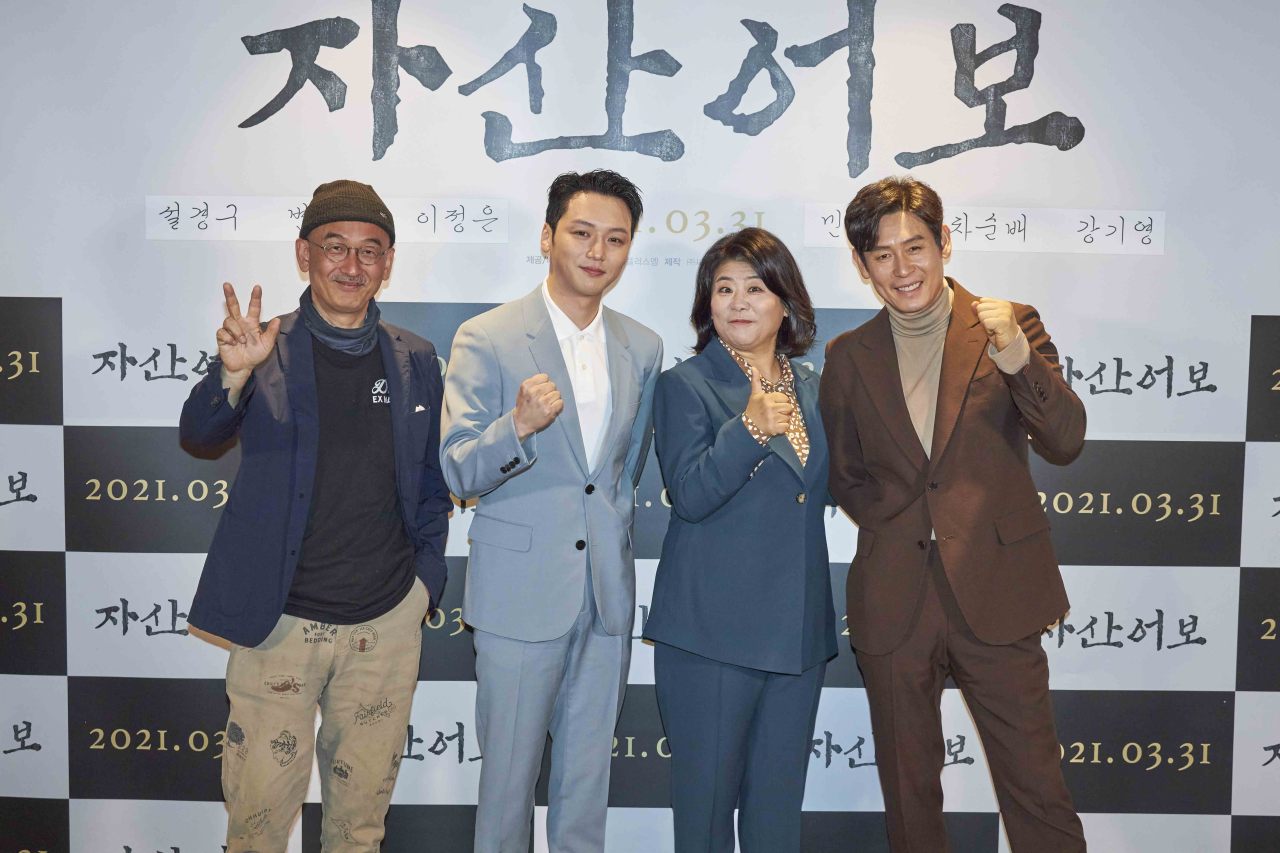Lee Joon-ik chose to focus on life of scholar-poet in upcoming film ‘Book of Fish’
By Song Seung-hyunPublished : March 19, 2021 - 18:01

Director Lee Joon-ik, a master of period films, chose to focus on the life of Joseon scholar Jeong Yak-jeon in his upcoming movie “Book of Fish.”
“I think there is an error in looking into and defining certain periods only by historical events and wars,” Lee said during a press conference at the Megabox Coex theater in Samseong-dong, Seoul, Thursday. He added that audiences are simply used to this because many existing period films approach stories this way.
“By looking into individuals that were rebellious at the time, I thought we could find out how the society actually modernized,” Lee said.
Lee’s new movie presents a fictional story based on a book by one of the leading scholars of the Joseon era. The scholar, Jeong Yak-jeon (Seol Gyeong-gu), was the older brother of Jeong Yak-yong, another leading scholar from the late Joseon era who is more widely known to the public.
At the beginning of the movie, Jeong Yak-jeon is sent into exile for accepting Christianity and other Western ideas. He arrives on Heuksando, a remote island off the coast of South Jeolla Province, and meets a young fisherman named Chang-dae (Byun Yo-han).
With some help from Chang-dae, Jeong starts writing a book about animals and plants living in the ocean.
“Chang-dae’s name appears at the beginning of Jeong’s book ‘Book of Fish,’” Lee said. This is where the director first got the inspiration for the movie script.
Since the young fisherman is all but absent from historical records, Lee had to use his imagination.
The upcoming film is Lee’s second black-and-white film. “Dong-ju: The Portrait of a Poet,” his 2016 film about real-life poet Yun Dong-ju, shows how Yun was imprisoned for his involvement in the Korean independence movement and died in a Japanese prison.
“The story of Dong-ju takes place in the Japanese colonial period, and he died early at the age of 28. I could not depict the story with a bright tone so I made it a black-and-white film,” Lee said.
But Lee said he chose black and white for his latest film for a different reason.
“I personally wanted to watch a black-and-white film that features the Joseon era,” he said. “‘Book of Fish’ is different (from ‘Dong-ju: The Portrait of a Poet’) because it has many cheerful scenes. Of course, it was also a difficult era for people. But there are characters like Gageodaek (Lee Jung-eun) and Byeoljang (Cho Woo-jin) that brighten up the mood of the film.”
Since black-and-white films are rare nowadays, acting in “Book of Fish” offered a new experience for many of the cast members.
Actor Lee Jung-eun said she’d tried to keep in mind that this was a black-and-white film throughout her performance.
“I tried not to exaggerate my facial expressions when performing. This is a black-and-white film, so a little movement matters a lot,” Lee said.
The new film also introduces many of the Jeong brothers’ poems to moviegoers.
“Poems from the Joseon era not only have literary value but also reveal how one views that world,” Lee said.
Some poems are uniquely presented in the movie through a “freestyle poetry battle” between two characters -- a competition that bears many similarities to a modern-day freestyle rap battle.
“Those used in the battle are all existing poems of Jeong Yak-yong,” the director said.
The film hits local cinemas March 31.
By Song Seung-hyun (ssh@heraldcorp.com)







![[KH Explains] Hyundai's full hybrid edge to pay off amid slow transition to pure EVs](http://res.heraldm.com/phpwas/restmb_idxmake.php?idx=644&simg=/content/image/2024/04/18/20240418050645_0.jpg&u=20240419100350)







![[From the Scene] Monks, Buddhists hail return of remains of Buddhas](http://res.heraldm.com/phpwas/restmb_idxmake.php?idx=652&simg=/content/image/2024/04/19/20240419050617_0.jpg&u=20240419175937)

![[KH Explains] Hyundai's full hybrid edge to pay off amid slow transition to pure EVs](http://res.heraldm.com/phpwas/restmb_idxmake.php?idx=652&simg=/content/image/2024/04/18/20240418050645_0.jpg&u=20240419100350)

![[Today’s K-pop] Illit drops debut single remix](http://res.heraldm.com/phpwas/restmb_idxmake.php?idx=642&simg=/content/image/2024/04/19/20240419050612_0.jpg&u=)